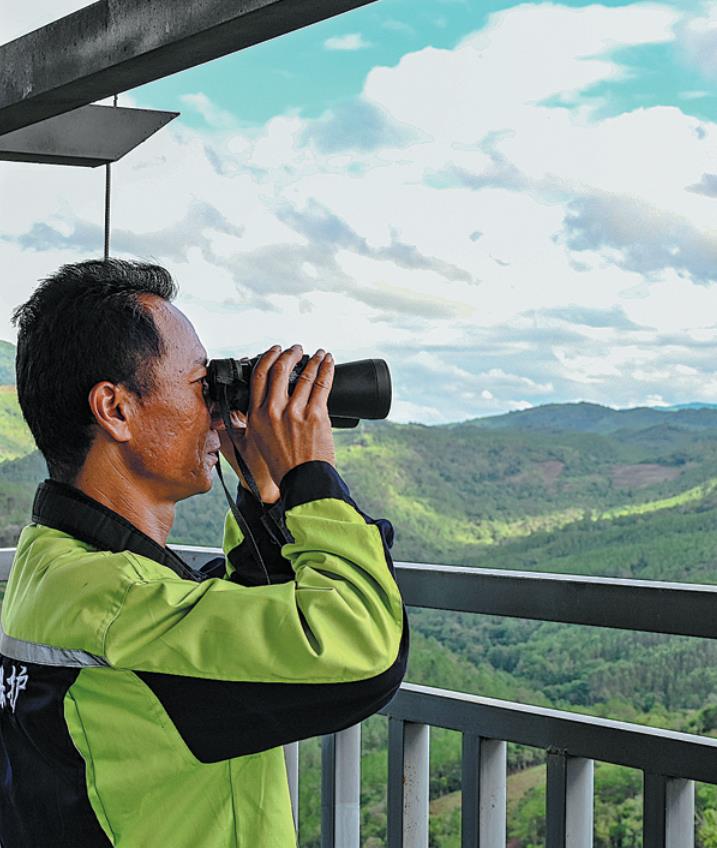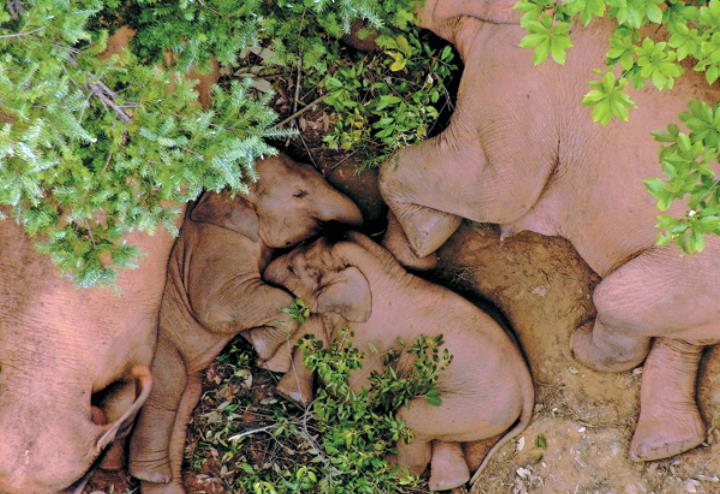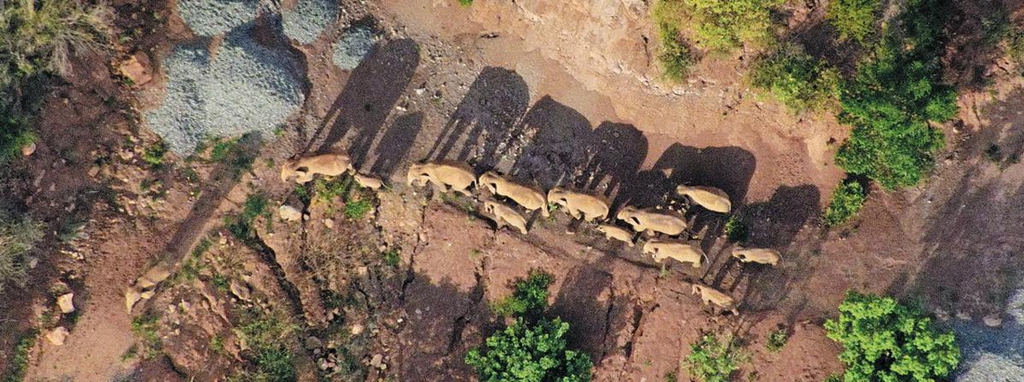Locals in Pu'er learn to live with elephants

A worker monitors the Asian elephants' habitat in Simao district, Pu'er city, Yunnan province, on June 15. [Photo/Xinhua]
Roaming herds pose new challenges in Pu'er
Zhou Zhitao has lost count of the number of times he has encountered wild Asian elephants in the past decade during his work with the forestry authority in Pu'er, Yunnan province.
He once pushed aside a leaf on a banana tree as he made his way through jungle, only to find a herd of roaming elephants just a few dozen meters away. He managed to flee to safety after jumping off a slope, which left him covered in scratches.
Zhou, who heads the authority's wild animal and wetland protection department, advised anyone encountering wild elephants to flee in the hope of finding a gully to jump into, as he has done several times. "The deeper the gully, the better," he added.
A herd of roaming elephants has been making headlines in China and overseas after unexpectedly trekking more than 500 kilometers north from its traditional habitat in Xishuangbanna National Nature Reserve, Yunnan.
Officials in areas where elephants have never appeared in recent times have suddenly found themselves having to monitor the animals in an attempt to avoid casualties.
With elephant herds in general now roaming further north, Zhou is among those working at the forefront of the country's ongoing efforts to ensure the harmonious coexistence of the animals and humans.
From initially feeling scared, to considering the elephants as regular visitors that arrive to escape the summer heat, many people in Pu'er have become increasingly accustomed to life with the animals, which can weigh as much as 5 metric tons.
However, the elephants are now roaming in areas where people have limited knowledge of them, posing challenges for local authorities in avoiding conflicts between the animals and locals.
Since a lone elephant entered Pu'er in 1992, the giant mammals have continued to arrive, according to the city's forestry authority.
Monitoring by the authority shows that 181 wild Asian elephants, or nearly 62 percent of the country's total, roam in areas of Pu'er that are home to more than 470,000 people.
Listed as endangered on the International Union for Conservation of Nature's Red List of Threatened Species, Asian elephants are under Class-A State protection in China. Thanks to joint protection efforts, the number of these animals in the wild in China has reached about 300, up from around 170 in the 1970s.
Zhou said the elephants have kept him busy since he joined the authority in 2009. "In the busiest times, I didn't go home for about two weeks," he said.
Majoring in computer science, he knew little about the animals when he started working with the authority. However, Zhou quickly learned from experience.
He said a male elephant that is driven away from a herd is usually the most dangerous animal, adding that it is also highly risky to approach a herd that has calves.
Zhou said it doesn't necessarily mean that elephants intend to hurt people if they charge at them, as sometimes the animals just want to play, but he added that as they are so strong, they can easily cause casualties.
"We certainly need to protect them, but we also need to take precautions against them," Zhou said.
There is no "one-size-fits-all "approach to monitoring elephant herds, because their temperaments vary greatly, he added.
For example, some herds seldom change their migration routes and usually appear in locations at a certain time. There is no need to watch such herds that closely, he said.
[page]

Firefighters use high-tech equipment to track the elephants in Yimen county, Yuxi city, Yunnan, on June 15.[Photo by Wei Xiaohao/China Daily]
Early warnings
Many rural residents in Pu'er have become increasingly familiar with the elephants, as the animals frequently visit their home areas.
Ding Chunlin, from Dazhai village, Yixiang township, said, "We have got used to seeing the elephants arrive."
Although adult elephants are huge, they can move at up to 36 kilometers per hour.
Ding said: "This means it can take them just over two hours to arrive at our village from the Wild Elephant Valley in the Xishuangbanna reserve. They often come to avoid the weather in August and September, when Xishuangbanna is hot and the farmland in Dazhai is covered in corn and banana trees.
"I saw a wild elephant for the first time when I was around 10 years old, when a lone animal came to my village," the 44-year-old said.
In August, roaming elephants remained in Dazhai for 19 days, before heading further north. As one of four villagers tasked with monitoring the herd, Ding said early warnings were received before the animals arrived in the village on Aug 19, and residents have remained on alert.
The herd regularly started to roam at about 7 pm. The elephants first bathed in fishponds before feeding and playing with one another until 1 am to 2 am. The areas they chose to rest in were usually flat and surrounded by scattered trees and creeks, Ding said.
He added that Asian elephants are clever but naughty. They often spray water on each other through their trunks, and Ding has frequently seen them striding across tea plantations.
Some villagers erected wooden poles around their fishponds to prevent wild animals entering. The poles were too short to stop adult elephants, but posed difficulties for the young animals when the herd arrived to bathe. The adults solved the problem by simply pulling the poles out with their trunks, Ding said.
"As long as we keep a safe distance from them, the elephants will not attack us," he said, adding that he can now judge if there are elephants in areas less than 500 meters away by sniffing the air.
"The elephants have become part of our life and work," Ding added.
Bi Shixue, from Meizi township, Pu'er, saw elephants for the first time in 1994, when he visited Wild Elephant Valley in Xishuangbanna.
Last year, working as a farmer and part-time ranger responsible for patrolling areas around his home, he was surprised by a visiting elephant herd.
[page]

The roaming elephants rest in Eshan county, Yunnan. [Provided to China Daily]
In late afternoon on Dec 21, trumpeting elephants broke the silence in Meile, which is surrounded by mountains. The trumpeting continued for hours, Bi said.
"I was scared," the 50-year-old added. "I thought the animals were in trouble."
However, on the second morning, Bi was pleasantly surprised when he saw signs that an elephant calf had been born.
He said villagers were excited to hear this news, as elephants are auspicious figures in traditional Chinese culture and "xiang", the Chinese name for elephant, translates as "good luck and happiness".
Without knowing the gender of the elephant calf, villagers prepared two names-Gaogao for a male and Lili for a female-as the area where it was born is located on Gaoli Mountain, Bi said.
Despite the elephants eating some crops in the village, he said insurers would pay compensation for the damage caused.
According to the Yunnan provincial forestry and grassland administration, in 2010, the province was the first area in China to introduce a pilot insurance program to award compensation for damage caused by wild animals. Using public funds, the program covered the entire province by 2014.
To date, a total of 297 million yuan ($45.8 million) has been paid in compensation in more than 130,000 such cases across the province, the administration said.
Bi believes the elephants arrived in his village because of the great improvements made to the local environment following the government's efforts to conserve forestry areas.
For Zhou, however, the fact that wild elephants are now entering areas they have never previously visited is a real headache.
"It's not easy for people in such areas to coexist harmoniously with wild elephants in a short time," he said.
As a result, in 2017, Zhou and his colleagues launched a pilot program called "elephant canteen". Based on years of monitoring, they mapped areas the elephants regularly pass through and planted crops especially for them, hoping that the food would confine the animals to certain locations.[page]

The elephants look for food in Yimen on June 15. The herd has made headlines since unexpectedly trekking more than 500 kilometers north from its traditional habitat. [Provided to China Daily]
Villagers hired
Local authorities have planted corn, banana trees and sweet potatoes on more than 130 hectares of farmland. The total area acting as an "elephant canteen" in Pu'er is expected to reach 1,000 hectares by 2025, Zhou said.
According to the city's forestry authority, the local government rents residents' farmland for 3,000 yuan per hectare to plant crops the elephants enjoy.
Zhou said more than 30 villagers were hired to work on this farmland. They plant seasonal crops to ensure that food is always available in the "elephant canteen".
The program has been effective, as no casualties have been caused by the elephants since it was launched, he said.
"After feeding in the 'canteen', the elephants will not enter villages to look for food. This helps reduce human-elephant conflicts," he added.